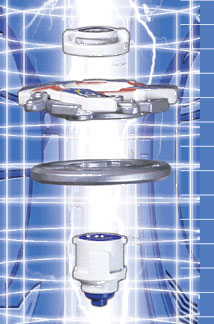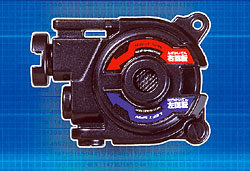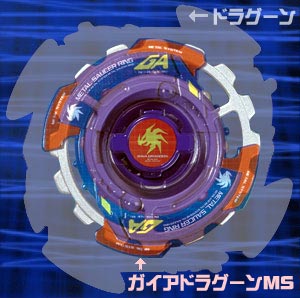Heavy Metal System

The Heavy Metal System (usually referred to as HMS) is the most recently released Beyblade system. What is so important to know about HMS is that it breaks compatibility completely with all previous systems; meaning, you can't interchange parts from HMS with previous systems. After the advent of HMS, all previous Beyblade systems can be referred to under the moniker "plastic Beyblades". HMS Beyblades can only use parts from other HMS Beyblades.
Contents
Components of an HMS Beyblade
There are four parts to an HMS Beyblade:
- Bit Protector (BP): In the case of plastic Beyblades, the Bit Chip was an essentially meaningless part in most cases. In HMS, the Bit Protector is vital; it is the "screw" that holds the entire Beyblade together, and is also the part of the Beyblade that the shooter latches onto.
- Attack Ring (AR): In HMS, the AR's functions remain fundamentally the same. However, there is one change that is perhaps the most important part of HMS: rather than being made purely out of plastic, it is made of two parts: the metal frame and the ABS caul. This addition of metal to the AR is one of the fundamental improvements that HMS has over plastic Beyblades.
- Weight Disk (WD): The circular form WD proved to be very effective in plastic Beyblades. In the case of HMS, all WDs were made circular. The standard weight disks are Circle Heavy, Circle Balance, and Circle Wide. There are also Customize Weight Disks (CWD), which are also circular, but contain room for a plastic that significantly alters the performance of the WD.
- Running Core (RC): HMS consolidated the Spin Gear and the Blade Base into a single part: the Running Core. The AR and WD slide over it, and the BP locks everything together. While the original RCs released were quite basic, some of the later models, such as Samurai Changer MS's Battle Change Core allow for many gimmicks and customization.
Size and Weight Difference
HMS Beyblades are much smaller than Beyblades from previous systems; generally, their size is about 75% of their predecessors. Despite this loss in size, their weight remains about the same due to the addition of metal to the AR.
This decrease in size is completely advantageous. Smaller, more compact Beyblades will have better balance and retain their spin velocity more effectively. The only disadvantage is a lower attack range, but this difference is meaningless considering the superior strength of HMS.
The Dual Shooter and G-Winder

Because HMS are fastened tightly by the Bit Protector, they will hold together regardless of the spin direction. The Bit Protector is completely symmetrical. The standard shooter for HMS, the Dual Shooter, has two holes to insert the winder: one for left spin and one for right spin. Because of this, the spin direction of HMS can be changed at will, with no need to change any Beyblade part or the shooter.
The new winder, the G-Winder, was an improvement in every way. Unlike the previous systems, which had both normal "short" winders and Dragon Winders, all G-Winders are the same length. They are made of a very stiff plastic that is easier to straighten, and the plastic is much more solid, rendering it difficult to break. The combination of the Dual Shooter and G-Winder makes for a pleasant experience.
Complaints about Dual Shooter Fit
Many players complain that the quality of Dual Shooters is inconsistent, with many being useless due to the fact that the Beyblade will not fasten securely to it. This has been proven to be true. While most Dual Shooters are made in China, the models made in Japan have been known to be of much higher quality.
Increase in Revolutions
The newly designed Beyblades and shooters lead to a 1.5-2x increase in the maximum spin velocity of these Beyblades Vs. older systems. This is an undeniable advantage, increasing performance in just about every area imaginable.
The Change of Gameplay
While HMS are not compatible with previous generations, in terms of competitive battling they are considered completely legal within the same playing field. When HMS was first released, some plastic Beyblades were still able to defeat them with reasonable consistency. However, as more were released, plastic Beyblades became more obsolete. Wolborg MS was the final "nail in the coffin", making plastic Zombie Beyblades obsolete.
Reaction from Players
Most players greeted the HMS series with reverence. The consensus was that the Engine Gear System was quite disappointing, and that HMS was was a move in the right direction. Players were excited about the faster, harder battles and the more effective and efficient designs of the Beyblades, shooters and winders.
However, there were -- and continue to be -- valid complaints about HMS. The most common one appears to be the complaint that HMS is inferior due to its lack of customization options. Indeed, there were far less HMS Beyblades released than plastic Beyblades, and there are far less parts involved compared to the 6-Layer system. The counter-argument to this is that because there are fewer parts involved, HMS battles involve more skill and strategy and do not rely on simple configuration options as much.
There is also debate as to whether or not it is fair for plastic Beyblades to fight Vs. HMS Beyblades. Officially, there is no argument to be had; it is completely legal. However, players can (and should) retain the right to decide amongst each other for recreational purposes. Most players will not fight an HMS against a plastic.
Conclusion
Despite criticism, there is one thing that is a fact: in terms of performance, HMS are far superior to every preceding system in every single way. For competitive play where all Beyblades are allowed, they are the best choice.
